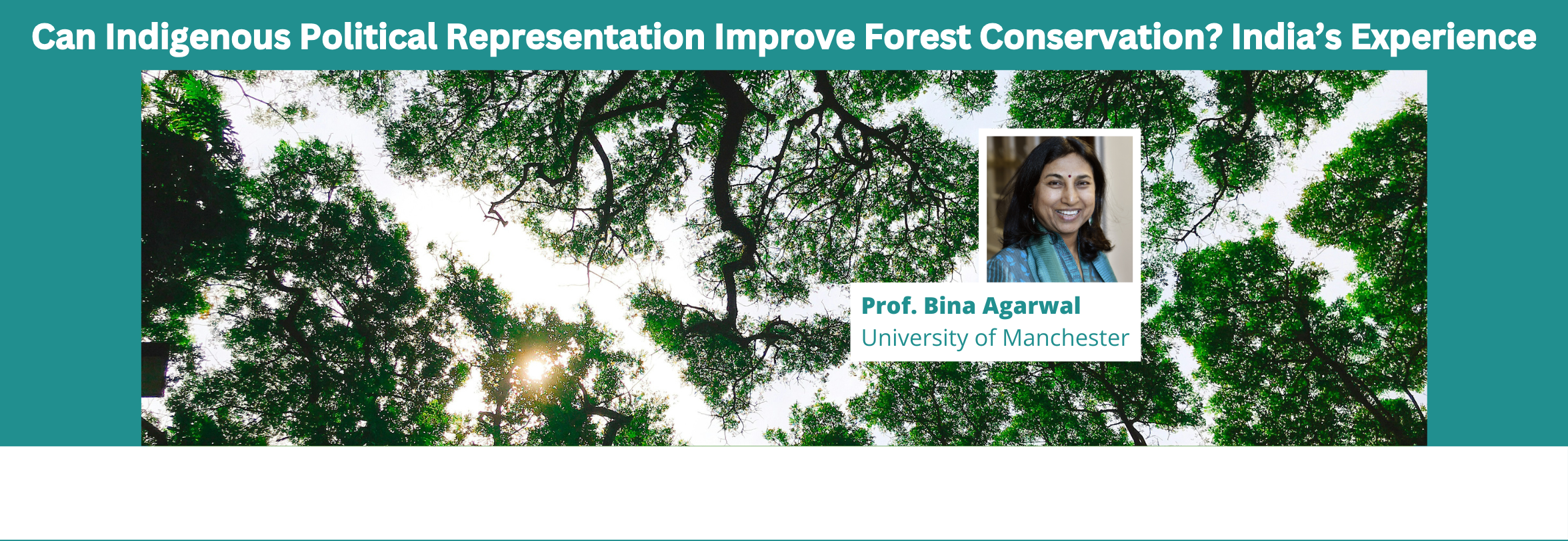
Prof. Bina Agarwal - Professor of Development Economics and Environment, University of Manchester
Joint CRI, CEENRG and Centre for Resilience and Sustainable Development (CRSD) seminar
Can Indigenous Political Representation Improve Forest Conservation? India’s Experience
Can political representation by indigenous communities – whom many see as stewards of forests – enhance forest cover and biodiversity conservation? Or would indigenous political control over forests catalyse greater extraction for revenue gains? Does the level of representation matter? This talk will address these under-researched questions, drawing on India’s uniquely multi-layered enactments which granted Scheduled Tribes political representation, and hence control over local forests, in constituencies reserved for them in state assemblies and village councils. Taking Chhattisgarh state as an example, the presentation will use geospatial technologies for assessing forest cover and decennial census data to compare the state’s 20,000-odd villages across reserved and unreserved categories, over 2001-2019, differentiating between Assembly Constituency (AC) reservations and PESA (Panchayat Extension to Scheduled Areas) reservations. This study (co-authored with Shamindra Roy and Shiva Sharma) is the first one globally to examine the conservation effect of indigenous political representation at multiple levels, over two decades, and will have relevance for other countries with large forest areas and indigenous populations.
Bina Agarwal is Professor of Development Economics and Environment at the GDI, University of Manchester, UK. She was earlier Director and Professor, Institute of Economic Growth, Delhi, where she is still affiliated. She has been President, International Society for Ecological Economics; President, IAFFE; Vice President, International Economic Association; and held distinguished positions at Cambridge, Harvard, Princeton, among other universities. She is an honorary fellow of Murray Edwards College, Cambridge.
Her research covers agriculture, environmental governance, property rights, gender inequality, and law. Her notable books include the award-winning, A Field of One’s Own (CUP 1994); Gender and Green Governance (OUP, 2010); and Gender Challenges (OUP, 2016), a three volume compendium of her selected papers. Her work on women’s land rights and on environmental governance has had global impact. Agarwal’s many awards include a Padma Shri in 2008, from the President of India; three book prizes; the 2010 Leontief Prize ‘for advancing the frontiers of economic thought’; 2017 Louis Malassis International Scientist Prize, France, for agricultural economics; International Balzan Prize 2017 for gender studies; the Kenneth Boulding award in Ecological Economics 2023, and the first Global Inequality Research Award, 2024, France.
For those wishing to join on Zoom, please register here
Forest photo credit: Kochi, by Firosnv. Photography
